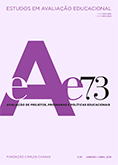Project evaluation and evaluative thinking: reporting an experience
DOI:
https://doi.org/10.18222/eae.v30i73.5821Keywords:
Project Evaluation, Learning, Participatory Environment, Evaluation CultureAbstract
The main purpose of this article is to throw light on the pedagogical potential of educational programs’ evaluations with the intention of building capacity of evaluative thinking in social organizations and their teams. It presents the path of a civil society organization in the educational field and the analysis of the learnings generated by the process of evaluating one of its projects. It was based on the reflective and self-evaluative perceptions of the professionals involved and obtained using data collection from semi-structured individual and collective interviews. The evaluation process, which was conducted in an interactive and dialogical way, contributed to the expansion of the critical consciousness about the project, favoring the development of the evaluative reasoning of the participants, guiding them to thinking evaluation critically, autonomously and actively. In conclusion, the pedagogical potential of project evaluations, for the construction of an evaluative thinking in organizations, is broad but still little explored.
Downloads
References
BRANDÃO, Carlos R. Pesquisa participante. 3. ed. São Paulo: Brasiliense, 1983. 1981.
BRANDÃO, Carlos R. Avaliação, participação. Anotações sobre um ritual de fim de período. Cadernos Cedes, Campinas, v. 12, n. 1, p. 57-64, 1984.
CHIANCA, Thomaz. Avaliações válidas, relevantes e úteis. In: FUNDAÇÃO ITAÚ SOCIAL; FUNDAÇÃO ROBERTO MARINHO; FUNDAÇÃO MARIA CECÍLIA SOUTO VIDIGAL; MOVE (org.). Avaliação para o investimento social privado: metodologias. São Paulo: Fundação Santillana, 2013.
COMUNIDADE EDUCATIVA CEDAC; FTD EDUCAÇÃO. Projeto Pequenos Leitores: um projeto de formação de educadores para a garantia do direito à literatura desde a primeira infância. São Paulo: FTD, 2018.
DAVIDSON, Jane. Tornar as avaliações estrategicamente práticas e relevantes. In: FUNDAÇÃO ITAÚ SOCIAL; FUNDAÇÃO ROBERTO MARINHO; MOVE (org.). A relevância da avaliação para o investimento social privado. São Paulo: Fundação Santillana, 2012.
DEMO, Pedro. Ciência, ideologia e poder – Uma sátira às ciências sociais. São Paulo: Atlas, 1988.
FALS BORDA, Orlando. Conocimiento y poder popular: lecciones con campesinos de Nicaragua, México y Coimbra: estudio preparado para los grupos de base y para la oficina internacional del trabajo. México: Siglo Veintiuno, 1985.
FETTERMAN, David. Transformative empowerment evaluation and freirean pedagogy: alignment with an emancipatory tradition. New Directions for Evaluation, n. 155, p. 111-126, Fall 2017.
FREIRE, Paulo. Pedagogia do oprimido. São Paulo: Paz e Terra, 2013.
GADOTTI, Moacir. The global impact of Freire’s pedagogy. New Directions for Evaluation, n. 155, p. 17-30, Fall 2017.
GUBA, Ergon; LINCOLN, Yvonna. Avaliação de quarta geração. Campinas: Editora Unicamp, 2011.
MARINO, Eduardo; LOCATELLI, Cristiane. Avaliação externa e avaliação interna: distinções, aplicações, competências do avaliador, passos e cuidados para a execução. In: OTERO, Martina Rillo (org.). Contexto e prática da avaliação de iniciativas sociais no Brasil: temas atuais. São Paulo: Peirópolis, 2012.
PATTON, Michael. Essentials of utilization – Focused evaluation. Thousand Oaks: Sage Publications, 2012.
PATTON, Michael. Pedagogical principles of evaluation: interpreting Freire. New Directions for Evaluation, n. 155, p. 49-78, Fall 2017.
PIAGET, Jean. A equilibração das estruturas cognitivas: problema central do desenvolvimento. Rio de Janeiro: Zahar, 1976.
SILVA, Rogério. Para fazer avaliações relevantes. In: FUNDAÇÃO ITAÚ SOCIAL; FUNDAÇÃO ROBERTO MARINHO; MOVE (org.). A relevância da avaliação para o investimento social privado. São Paulo: Fundação Santillana, 2012.
SILVA, Rogério; BRANDÃO, Daniel. A escolha de métodos para fazer avaliação. In: FUNDAÇÃO ITAÚ SOCIAL; FUNDAÇÃO ROBERTO MARINHO; FUNDAÇÃO MARIA CECÍLIA SOUTO VIDIGAL; MOVE (org.). Avaliação para o investimento social privado: metodologias. São Paulo: Fundação Santillana, 2013.
SILVA, Rogério; VARGAS, Ana Carolina. Avaliação e investimento social privado: acúmulos, limites e disrupção. In: SAEZ, Erika; SANTIAGO, Graziela; ZACCHI, José (org.). Censo Gife. São Paulo: Gife, 2017.
THIOLLENT, Michel. Crítica metodológica, investigação social e enquete operária. 3. ed. São Paulo: Polis, 1982.
VARGAS, Ana Carolina; SILVA, Rogério. Avaliação para o investimento social privado: comunicar e utilizar a avaliação de maneira efetiva. São Paulo: Grupo de Institutos e Fundações Empresariais (Gife); Fundação Roberto Marinho; Itaú Social, 2017a. Disponível em: https://sinapse.gife.org.br/download/avaliacao-para-o-investimento-social-privado-comunicar-e-utilizar-avaliacao-de- maneira-efetiva. Acesso em: 14 jan. 2019.
VARGAS, Ana Carolina; SILVA, Rogério. Avaliação para o investimento social privado: criar condições antes de avaliar. São Paulo: Grupo de Institutos e Fundações Empresariais (Gife); Fundação Roberto Marinho; Itaú Social, 2017b. Disponível em: https://sinapse.gife.org.br/download/ avaliacao-para-o-investimento-social-privado-criar-condicoes-antes-de-avaliar. Acesso em: 14 jan. 2019.
VARGAS, Ana Carolina; SILVA, Rogério. Avaliação para o investimento social privado: definir o caminho metodológico mais adequado. São Paulo: Grupo de Institutos e Fundações Empresariais (Gife): Fundação Roberto Marinho; Itaú Social, 2017c. Disponível em: https://sinapse.gife.org.br/ download/avaliacao-para-o-investimento-social-privado-definir-o-caminho-metodologico-mais- adequado. Acesso em: 14 jan. 2019.
Downloads
Published
How to Cite
Issue
Section
License
Copyright (c) 2019 Estudos em Avaliação Educacional

This work is licensed under a Creative Commons Attribution-NonCommercial 4.0 International License.
Authors who publish in this journal agree to the following terms:
a. Authors retain the copyright and grant the journal the right to first publication, with the paper simultaneously licensed under the Creative Commons Attribution License (CC BY 4.0) license that allows the sharing of the paper with acknowledgment of authorship and initial publication in this journal.
b. Authors are authorized to assume additional contracts separately, for non-exclusive distribution of the version of the paper published in this journal (for example publishing in institutional repository or as a book chapter), with acknowledgment of authorship and initial publication in this journal.
c. Authors are allowed and encouraged to publish and distribute their paper on-line (for example in institutional repositories or on their personal page) at any moment before or during the editorial process, as this can generate productive changes, as well as increase the impact and citation of the published paper (See The Effect of Open Access).








